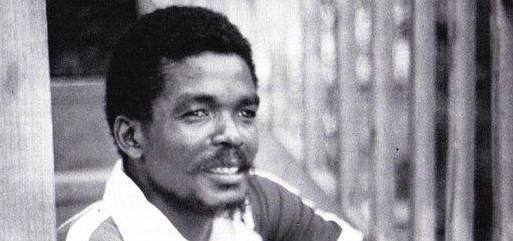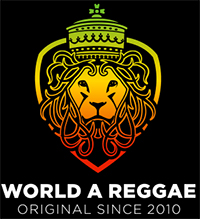This is a big week in the Marley universe. Not only do we have the world premiere of the long-awaited “official and definitive” Bob Marley documentary film, but we also have the world premiere of Damian Marley’s new video for his single “Set Up Shop.” With all the fanfare, it’s easy to forget an event that is perhaps just as important as both of these. For this event shook the Wailers family to the bone, the second of two premature deaths that would befall perhaps the greatest touring band of all time in the 1980s. I’m speaking, of course, of the cold-blooded murder of the legendary Carlton Barrett, who was shot to death in his front yard while returning home on the evening of April 17, 1987 . I write this not to tell the sad story of a gifted drummer, who for more than 20 years, was the backbone of the Wailers band. I write this to celebrate the life of a man who has brought so much joy to others by practically inventing a new style of drumming. A style of drumming that would give life to a whole new genre of music.
The importance of drumming, and of the drums, in reggae cannot be overstated. If one were to describe a true reggae riddim as a house for example, the drums would make the foundation; the bass would make the structure; and everything else would be decorative. The fact is that drumming, and drumming styles, can be traced back to ancient tribes in Africa who would use a “talking drum” to communicate. Drumming is almost synonymous with Africa; it symbolizes origins. According to Maureen Warner-Lewis, it has come to “symbolize Africa itself.”
There are many talented and influential reggae drummers, including Leroy “Horsemouth” Wallace, Lloyd Knibb, Winston Grennan, Mikey “Boo” Richards, Larry McDonald, Sly Dunbar, and the list goes on. Many would argue that reggae drumming is the most difficult style of drumming around. In my opinion, the most influential; the most talented; the most precise reggae drummer in history is the one and only Carlton “Carly” Barrett, the “Field General” of reggae drummers.
Carly was born in Jamaica in 1950 to Wilfred and Violet Barrett. Building his first drum set from paint cans, he and his brother Aston, the legendary Wailers bass player, practice endlessly on the famous ska tunes of the day. In the late 60’s the brothers develop their own signature sound and form the “Soul Mates” and “Rhythm Force” riddim syndicate. The boys soon team up with legendary vocalist Max Romeo to form “The Hippy Boys”. The Hippy Boys become a sought after backing band in the Kingston town area. Their first recording is “Watch This Sound“, backing the late Slim Smith. They also release a couple of albums for Lloyd Charmers, Reggae With The Hippy Boys and Reggae Is Tight. As well as playing on many sessions for dub master Bunny Lee and Sonia Pottinger, the Barrett brothers also play on two 1969 UK chart hits, “Liquidator” for Harry J, and “Return Of Django” for Lee “Scratch” Perry, with whom they take root.
As the rhythm section for Perry’s “Upsetters” band, they knock out a long run of instrumental classics, including “Clint Eastwood,” “Cold Sweat,” “Night Doctor,” and “Live Injection.” It is while with Perry that the Barrett brothers first team up with the struggling Wailers, then a vocal trio consisting of Bob, Peter and Bunny. After recording many now-classic numbers, Carly and Aston decide to team up with The Wailers on a permanent basis. The rest is history.
Carly is credited with writing the classic Bob Marley song “War” (using a famous Haile Selassie speech as lyrics) and with his brother Aston, is credited with co-writing “Talkin’ Blues.” Carly is featured on all the albums recorded by the Wailers along with brother Aston. Barrett is perhaps best known for popularizing the “one-drop” rhythm, a percussive drumming style created by Winston Grennan. With Carly’s beats and his brother Aston’s bass, the Wailers’ rhythm section plant the seeds of today’s international reggae.
While much of the credit for The Wailers success is often bestowed upon Marley (and understandably so), it is easy to understate the importance of Carly’s drumming. However, one would be hard pressed to find another drummer from the “golden age” of reggae who possessed the technique, precision, and feel of Carlton Barrett. Technique and “feel” are the two most important qualities of a great reggae drummer. Many are under the false impression that reggae music, and reggae drumming for that matter, is simple and unrefined, while the truth is quite the contrary. Talk to any experienced drummer and they will tell you that reggae drumming is one of the more difficult styles to play. This is because the drummer must develop and refine a certain style, feel, and technique that is unique to reggae. This comes only through years and years of practice as a reggae drummer. It is often said that reggae drumming can not be taught, but must be felt. Carly truly felt it more than most, as his improvisation and drum fills are simply astonishing at times. ‘Who feels it knows it.’
Like many talented Jamaican musicians from the golden age of reggae, Carly met an early, violent end at the age of 36, ironically the same age that Marley met his physical death. Whilst returning home one night from grabbing dinner after a rehearsal, Carly is ambushed outside of his Kingston residence by a gunman and is shot dead. While the murder is officially recorded as a domestic matter. It was discovered shortly after is death that his wife and her boyfriend conspired to have him killed.
Carlton Barrett has influenced every reggae drummer of today. Every one of them aspire to obtain Carly’s feel, his technique, his discipline, however, Carly was given a gift from the Most High. He, along with Bob and his Wailers, had a message of “one love” to spread to the world. Perhaps his work was over.
“I say fly away home to Zion (fly away home);
I say fly away home to Zion (fly away home).
One bright morning when my work is over,
Man will fly away home.”“Rastaman Chant“
Give thanks to my good friend Mike Van Der Linde for sharing the featured photograph of Carlton.





Jah bless from new orleans.I am proud to say jah is my foundation an i;ve studying carly for 20 yrs, i just have to get the right ludwig snare drum, its not easy to come by,but i;m still searching Money is an issue. Im also a song writer,and a keyboard bubbler(much respect to mr lindo and mr downie. The i;ve written are not for the weak heart and gon probally start a whole lotta shit, but i and i ready.Im not a vocalist but can sing.Im a CARLRY,horsey,stylee,sly dunbar,stelie and clevee student of the kings music.I hope i get the privdgle to chop it up with some veterans in the music,and be able see jamaica for de 1st time would love dat.
Give thanks for the beautiful article on an outstanding & unique talent, the great Carlton Barrett. I an I just finished listening to Carly & Familyman on the tuff dub cut Of Keith Hudson’s “Michael Talbot Affair” . JAH LIVE, guide & protect 4-Iver more.